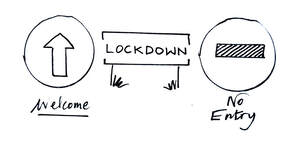People with dementia are already locked into deteriorating conditions of the mind which manifest in various types and degrees of distress. An obvious outcome is the inability to negotiate on one’s own account for basic needs such as companiable daily living.
People in care homes, including those with dementia, who have come directly from a spell in hospital or who have had any contact with anyone discovered to be positive for COVID have been restricted to their rooms for different periods of time.
This situation has been a crucial point of discussion and concern for over a year, as the effect of isolation is the opposite of that of care.
One of the poems in Precious Work, I call ‘Experts,’ speaks in the voices of a couple of seasoned care home residents who, for whatever reasons acceptable at the time, found their way into care some time ago. They are used to and have accepted their now accustomed way of life and enjoy communicating. In fact they can convey their opinion of lockdown on behalf of others in the home who are less able:
. . .you’ve come to see
the experts.
Lockdown
is what
we do.
They explain to some well-meaning visitors, during a meeting carefully arranged for them between COVID closures, that lockdown is by no means a new concept to them as they have been locked up for years. They are good pals which has been their lifesaver, especially as any relatives went out of the picture years ago.
But the fact remains that the double lockdown of quarantine for those with dementia and little or no understanding of pandemics, has been the hardest of hard times. The gradual lifting of restrictions is thankfully enabling more doors to be opened again to the outside world.

 RSS Feed
RSS Feed